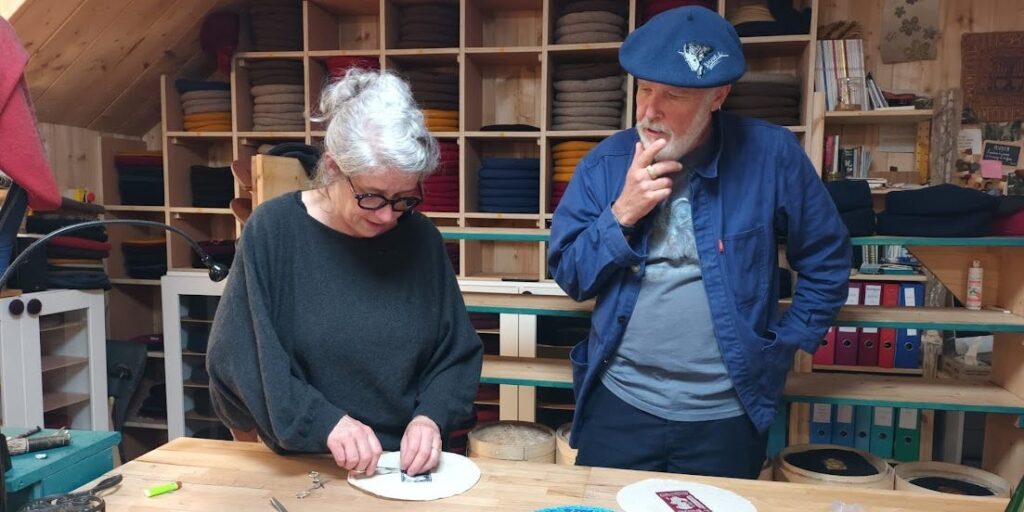In a warehouse in New Zealand, thousands of berets sit in limbo.
The caps belong to Daan Kolthoff, the founder of South Pacific Berets. Kolthoff has spent nearly two decades running the beret retailer, where 85% to 90% of buyers are from the US.
That pipeline has suddenly shut off.
Last week, New Zealand’s national postal service — along with many others worldwide — paused US-bound parcel delivery. The big change came ahead of the Trump administration’s decision to end a long-standing tariff exemption on small packages below $800, known as the de minimis rule, which kicks in on Friday. Customs and Border Protection processes about 4 million de minimis shipments a day.
The suspension has thrown small businesses like Kolthoff’s into turmoil.
“The first thing for me to do was cancel existing orders, give information to customers; however, there was very little information to give,” Kolthoff told Business Insider. “It’s very unclear how long it would last — whether it’s a matter of days, weeks, or months. And that is still the case.”
He refunded under $2,000 worth of orders to US-based customers in recent days and is bracing for more losses by the end of the month.
“I have a warehouse full of berets. They are already paid for. I need to sell berets eventually,” said Kolthoff, whose one-man operation generates $100,000 to $120,000 in annual revenue.
From Friday, all package deliveries to the US will face duties, prompting the postal carriers of at least 25 countries to pause package deliveries to the US. There are exceptions, including documents and personal gifts valued up to $100.
Postal operators cite confusion over processes and say they need time to implement systems for the extra paperwork. It’s unclear when shipping will resume.
Private couriers like FedEx or UPS are still moving parcels to the US, but the costs can be prohibitive for small retailers.
“The costs of shipping often equal or exceed the actual value of the contents,” Kolthoff said. Most of his packages are under $100 in value.
Small sellers scramble
In Japan, online stationery shop Neko Neko Post is also grappling with the fallout from the US’s tariff shakeout. US customers account for 85% of its customer base.
“The tariff announcements have been a huge shock to us,” cofounders Sharla Hinskens and Ushka Wakelin told Business Insider via email. “For such a small business, the impact has been devastating.”
They said Neko Neko Post isn’t willing to pass on the risk of potentially high duties — $40 to $150 per order — to customers.
The duo, who launched their cat-themed shop in 2020, suspended US shipping after August 23. When they announced the cutoff 10 days before that, demand spiked.
“We received several hundred orders within a couple of days, which is a first for us, so we were working morning and night to get those sent out in time,” Hinskens and Wakelin said.
In India, handloom sari seller Kalaneca also saw anxiety ripple through its US customers, who account for 65% of its foreign orders. Founder Kavea R Chavali uses a private courier to ship to the US, so her business hasn’t been disrupted by postal suspensions — but the looming duties triggered a surge in orders before the cutoff.
On one particular day, her 19-person team jumped from shipping a handful of saris a day to nearly 50.
Searching for workarounds
Neko Neko Post is now brainstorming new ways to reach US customers, including a smaller version of its top-selling journal and stickers that could fit into small envelopes. It’s also offering delivery to hotels for tourists visiting Japan.
“Losing access to that market overnight has been truly horrible, and it forces us to rethink how we can sustain the business long-term without that loyal community,” the owners of the Japan-based business said.
Chavali said Kalaneca is still waiting for clarity on how tariffs above $800 will be applied and is working with logistics partners to find solutions, which could include consolidating orders and sharing costs with customers.
The value of US orders typically ranges from $300 to $2,000, and some customers have already said they’re open to paying a modest extra charge, she added.
As for Kolthoff, he said he is trying to diversify his customer base and plans to connect with other affected small businesses in New Zealand.
Few easy options
Manish Kapoor, the CEO of Growth Catalyst Group and a former FedEx and Amazon logistics executive, said private couriers may be the only fast fix.
“Yes, the cost per package is higher, and it’s a tough choice between getting goods to customers at a higher cost or not at all,” Kapoor said. He added that small businesses could consider pooling shipments or working with freight forwarders.
“For micro-businesses, consolidation is critical to survival post-de minimis,” said Sean Henry, the CEO of Stord, a logistics startup.
“First, moving to US-based fulfillment could lower their shipping costs — domestic parcels are much faster and cheaper than international parcels, now that the duties are equal. Then, they can take more dramatic steps,” Henry added, citing strategies such as bundling products into kits and raising free shipping thresholds to boost profit margins.
The experts’ advice may offer a playbook, but none of it solves the underlying uncertainty amid the US’s changing tariff landscape.
And when regular postal services do resume, US consumers should expect to pay more to cover the extra costs.
“I can’t bear the increase in prices. It’s just too small a business to deal with it,” Kolthoff said.
Read the full article here
















